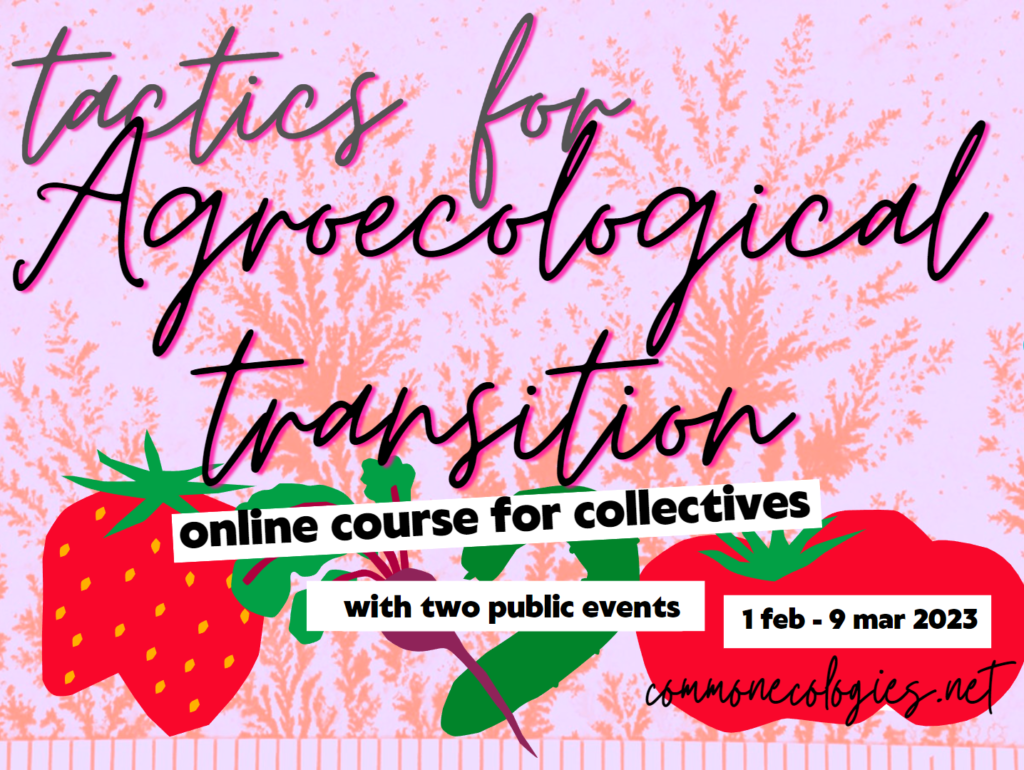Tactics for agroecological transition – (re)claiming land, labour, and livelihoods
Online course for collectives & public event series for all (2023)

1st Feb – 9th March 2023
6 sessions in late afternoons (CET), on Zoom
2 public events, 1st Feb and 9th March, on Zoom
With: ABL (DE), Ackersyndikat (DE), Arran de Terra (ES), La Bolina (ES), Colletivo Epidemia (IT), Area de Agroecología de Ecologistas en Acción (ES), Inland (INT), Interprt (INT), Jornaleras de Huelva en Lucha (ES), SALT (Solidarity across Land and Trades, UK), Mar Menor Platform (ES), Mondeggi Commons (IT), co-organisers of the Vergesellschaftungskonferenz (DE), and others
——
Contents. Agricultural transformation is a vital battlefield for common planetary survival and care. This course is a co-learning process for collectives, in which we share and elaborate tools and tactics for agroecological struggle. Bringing together different collective agents of agricultural transition and radical rural transformation – from migrant land workers to farming collectives and ecological and community platforms, from different countries and countrysides – we focus on four key dimensions of this struggle: labour and migrant rights; access to land and struggles for common property; local and commons-based economies; and transformative agriculture against climate crisis and ecological devastation. Through four thematic sessions, as well as an introductory networking hour and a final assembly, we bring together tools and tactics from different places – focusing on Europe as institutional-legal and social battlefield.
Aims. The aim of this course is to inspire and enable translations and alliances, strengthen networks and debates. It will be the basis for the collective editing of a micro-manual of tactics by Common Ecologies and allies. And it will connect to an event series that fleshes out broader dimensions of agroecological transition, as vitally important field of struggles in our current times of food, climate and energy crisis.
How to join. The course is for collectives only. We invite all interested groups, platforms, campaigns and associations to come forth and express their interest (button below). We also welcome newly formed groups – whoever you are, feel free to form a team and use this course to channel collective thinking! This course is free. To make it more accessible, we offer two stipends of 200€ for groups who could not otherwise afford to participate. Also we can offer Spanish-English translation for some sessions.
Public Events. Anyone wishing to follow this process as an individual, you can’t join the course but please join our event series, where we discuss issues and present hypotheses and outcomes related to the course: on 1st February and 9th March (see below). Make sure to also check new episodes of the Earthcare Fieldcast made for this course.
REGISTRATIONS HAVE NOW CLOSED, THE COURSE IS FULL. BUT DO WRITE US IF YOU WANT TO GET COURSE MATERIALS SENT AND HAVE US KEEP YOU POSTED.
Course Sessions
Weds 1st February, 18-19.30 CET
Session 1. Introduction and networking.
Session for all groups to get to know each other, identify and define core problems and strategies, introduction of course structure and infrastructure.
1st February, 19.30-21.00h
Online Public Event. Facilitating Local Agroecological Transition
Daniel López García presents our brand new translation of the Manual for Facilitating Local Agroecological Transition, its specific strategic and practical horizons, and the Arran de Terra cooperative talks about their work of agroecological facilitation. With an introduction by Common Ecologies and a comment by Inland/Campo Adentro.
Weds 8th February, 18.30-20.30 CET
Session 2. Beyond exploitation: Feminist, Anti-Racist and Ecological Social Syndicalisms in Agriculture
This session foregrounds feminist, anti-racist and ecological social syndicalisms as strategies for fighting industrial agriculture from within. Starting from an analysis of agroindustrialism, it’s clear that migrant seasonal workers are its key and at the same time most exploited workforce. They’re invisibilised, alongside the (hi)stories of extractivism/landgrabs/peripheralization/ colonialism they come from, and they’re rarely imagined as part of transformation, not to mention as drivers of it. In this session, we start from the realities, knowledges, and organisations of farm workers, bringing together struggles in industrial agriculture with farm worker organisation in peasant and collective agriculture. We cannot have a just agricultural transformation without addressing questions of work permits, labour exploitation, migrant and global justice. Based on participant experiences, we’ll discuss agri-social syndicalisms and their tactics, legal and organisational tools and campaigns for regularization via agriculture, budding farm workers unions, and more.
Weds 15th February, 18.30-20.30 CET
Session 3. Beyond private property: Socializing and (re)Claiming land for Transformative Agriculture
The land question is at the heart of transforming agriculture away from a predatory extractivist model towards a socially and ecologically just food system. Big corporations hold and buy up large areas of land, destroying soil, draining groundwater supplies and creating exploitative labour markets. In this session we want to think about land, not just by learning about landgrabs and degradation but by positing the socialization of land as a possible horizon of change. We take inspiration from the German Vergesellschaftungs-activism that is currently imagining ways of communalizing/socializing a variety of sectors, after the victory of the Berlin referendum for expropriating major corporate landlords. We will learn about the legal dimension of possible ecosocial expropriation, but most importantly focus on how social bases for such demands may be built, and what that might mean in relation to agriculture. Based on participant experiences, we’ll discuss financial-infrastructural models for collective farm ownership, campaigns for public land lease based on the common good (Gemeinwohlverpachtung), land occupation for agricultural commons, legal frameworks of civic use, community-driven referenda on land use and other tactics.
Weds 22nd february, 18.30-20.30 CET
Session 4. Beyond the capitalist food system: Cooperatives, Commons Economies and Local Agroecological Facilitation
In this session we take a closer look at how to fight unjust socio-economic dynamics affecting rural populations, such as depopulation, the revolving doors of precarious work, and the defunding of local social infrastructures. Agricultural transition means a transition away from those, towards a communitarian and solidarity-based model of production and reproduction. It means questioning narratives of development by proposing sustainable forms of re/counter-development, learning from cooperative experiences and exploring the possibilities of different legal and institutional frameworks for change. From the local to the regional, national and EU levels, what laws, norms and policy frameworks may be used to push for agroecological transition? What municipalist impulses may we learn from in this sense? Based on participant experiences, we’ll discuss facilitation tools for local agroecological transition, agri-commons, community box-schemes and agri-cooperatives, migrant workers incorporation into local agri-economies, municipalism, and other tactics.
Weds 1st march, 18.30-20.30 CET
Session 5. Beyond Ecocide: organizing, research and legal battles against agro-extractivist destruction
Agroindustry promotes the exploiting and poisoning of ecosystems as much as of people, increasingly greenwashed but no less destructive. In the face of this, we must urgently find ways of opposing agri-ecocide, through social mobilization, legal and institutional battles, and the weaponizing of knowledge for socio-ecological change. In this session we learn from collective endeavours to oppose extractivist, toxic agriculture, that develop other ecologies of struggle, knowledge and care in the face of greenwashing and technofixes. Based on participant experiences, we’ll discuss popular legislative initiatives for the rights of nature, the production of knowledge and evidence against ecocide, and the struggles for recognition of ecocide as a crime.
Thurs (!) 9th March, 18h-19 CET
Session 6. Final assembly. Common strategies within and beyond crisis: agri-transition against food crisis, ecological crisis, energy crisis, social crisis
Framing of final assembly: current crisis context (cost of living crisis, food crisis, energy, climate), urgent problems and needs, role of agricultural-ecological movements in this. What do we take away/ what should be done / continuities. Debrief and feedback from course
Thursday 9th March, 19.30-21.00 CET
Why agri-transition is vital, and how we can build common strategies
Public online event with a presentation of course outcomes by Common Ecologies, followed by presentations by Stefania Barca, Jason Moore, Amaranta Herrero and Andrea Ghelfi.

This series is organized in cooperation with the MovE project at Jena University.
